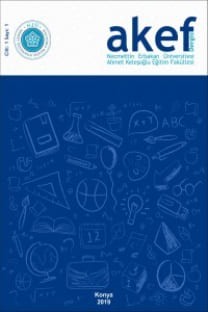Eylem Odaklı Yaklaşımın Hafif Düzey Özel Dil Öğrenme Güçlüğü Olan Öğrencilere İngilizce Öğretimine Etkisi
Eylem-odaklı yaklaşım, hafif düzey özel dil öğrenme güçlüğü, dil öğrenme becerileri
The Impact Of Action- Oriented Approach On Teaching English To Students With Mild Specific Language Learning Difficulties
action oriented approach, mild specific language learning diffculties, language learning skills,
___
- Atay, D., Kurt G., Çamlibel, Z., Ersin, P., Kaslioglu Ö., (2009). The Role Of Intercultural Competence In Foreign Language Teaching: Inonu University Journal Of The Faculty Of Education.
- Bento, M. (2013). Pour une définition de l’action dans la perspective actionnelle en France. Synergie Canada, (5), 1-9.
- Bernard, H.R. (2000) Social Research Methods: Qualitative and Quantitative Approaches. Sage Publications, Thousand Oaks.
- Bratton, I. (2015). Multi- Tiered System of Supports (MTSS) Response to Intervention: Wakulla County Schools,UK.
- Brown, J. D. (1995). The elements of language curriculum: A systematic approach to program development. Boston, MA: Heinle & Heinle.
- Delvolvé, N. (2006). Métacognition et réussite des élèves. Retrieved from http://www.cahierspedagogiques. com/article.php3?id_article=2767.
- TEPAV Project Team. (2013). Turkey national needs assessment of state school English language teaching. Ankara: Mattek Publication.
- Eurydice. (2012c). Developing key competences at school in Europe: Challenges and opportunities for policy. Eurydice Report. Luxembourg: Publications Office of the European Union.
- Eurydice. (2017). Key data on teaching languages at school in Europe. Eurydice Report. Luxembourg: Publications Office of the European Union.
- Grangeat, M. (1999). La métacognition, une clé pour des apprentissages scolaires réussis. In Grangeat (coord.), La métacognition, une aide au travail des élèves (pp. 153–172). Paris: ESF éditeur.
- Jensen, E. (1994). The learning brain, USA: Turning Point Publishing.
- Koksal, O. and Atalay, B. (2016). Teaching Principles And Method: Contemporary Practices, Methods And Techniques: Egitim Publishing.
- Marks, B., (2007). Cultural competence revisited: nursing students with disabilities. Journal of Nursing Education 46 (2), 70–74.
- [Ministry of National Education] (2017) [General Directorate of Special Education, Guidance and Advisory Services] (n.d.) Ankara, TURKIYE
- Mirici, H. (2017). European policies and practices in training foreign language teachers: Hacettepe University Journal of Education Faculty
- NCCA, National Council for Curriculum and Assessment (2019). Communication andLanguage, guidelines for Teachers of Students with Mild Language Difficulties, General Learning Difficulties (Accessed at 29.12.2019)
- Patton, M. Q. (2002). Qualitative Research & Evaluation Methods. 3rd edition. Sage Publications, Inc.
- Peculea, L. (2014). Investigating learning difficulties at Romanian language and literature subject in perspective of learning to learn competence development, ScienceDirect Procedia - Social and Behavioral Sciences 180 ( 2015 ) 666 – 673.
- Pollak, D., (2009). Neurodiversity in Higher Education. John Wiley & Sons, Ltd, Hoboken.
- Sari, H. (2017). The influence of an in-service teacher training (INSET) programme on attitudes towards inclusion by regular classroom teachers who teach deaf students in primary schools in Turkey : Deafness & Education International
- Sin, C.H., Fong, J. (2008). Do no harm? Professional regulation of disabled nursing students in Great Britain. Journal of Advanced Nursing 62 (6), 642–652.
- Springer, C. (2009). La dimension sociale dans le CECR: pistes pour scénariser, evaluer et valoriser l'apprentissage collaboratif, Le Français dans le Monde/ Recherches et Applications, 66(4), 511-523.
- TEPAV Project Team. (2013). Turkey national needs assessment of state school English language teaching. Ankara: Mattek Publication.
- Vianin, P. (2011). Ajutorul strategic pentru elevii cu dificultăți școlare, Editura ASCR, Cluj-Napoca
- Wernicke, M (2014). Action-oriented language teaching – „Ja genau!“ Forum Deutsch: Forschungsforum.
- Westwood, P. (2008). What teachers need to know about learning difficulties, ACER Press, Australian Council for Educational Research Ltd.
- Yayın Aralığı: Yılda 2 Sayı
- Başlangıç: 1987
- Yayıncı: Necmettin Erbakan Üniversitesi
Matematik Öğretmeni Adaylarının Etnomatematik Farkındalıklarının İncelenmesi
Hatice Merve İMİR, Belma TUĞRUL
Merve Gül KOÇAKOĞLU, Süleyman Barbaros YALÇIN
Okul Müdürlerinin Denetim Görevlerini Yerine Getirmede Karşılaştıkları Güçlükler
Hayriye Gül KURUYER, Emel BAYRAK ÖZMUTLU, Saniye Nur ERGAN
Dijital Çağın Matematik Dersinde Öğretmenler: Uzaktan Eğitimin Gerçek Yüzü
İbrahim ÇETİN, Elif GÖÇEBE YÜCEER
Eğitimde Chatbot Kullanmaya ve Öğrenmeye Yönelik Davranışsal Niyet Ölçeğinin Türkçeye Uyarlanması
Hatice YILDIZ DURAK, Aytuğ ONAN
Öğretmenlerin Özel Gereksinimli Öğrencilere Yönelik Öğretmen Sosyal Kabul Düzeylerinin İncelenmesi
Kimyasal Tepkimelerde Hız, Denge ve Enerji Konularıyla İlgili Yapılan Çalışmaların İçerik Analizi
